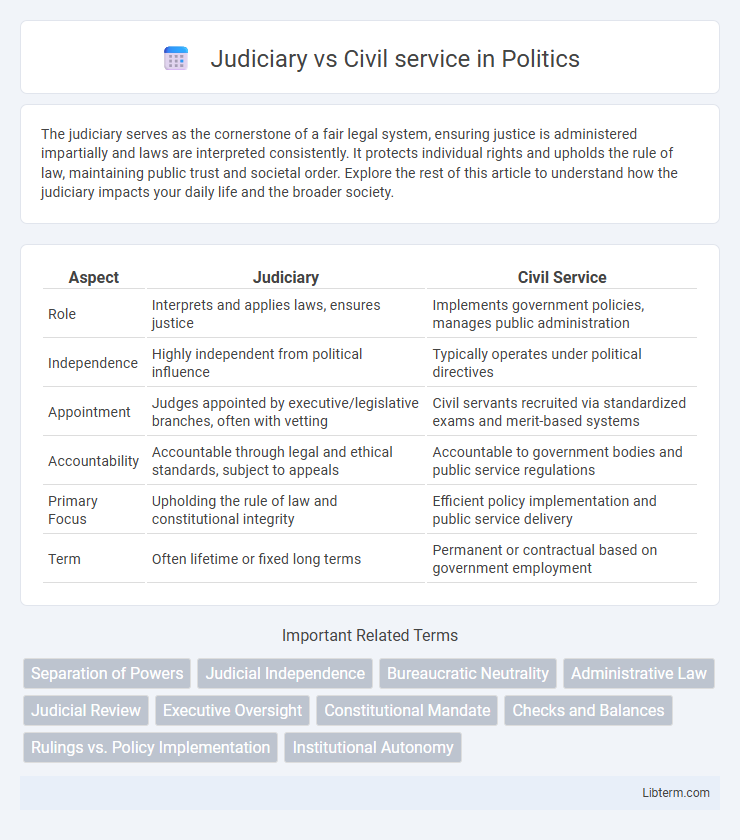The judiciary serves as the cornerstone of a fair legal system, ensuring justice is administered impartially and laws are interpreted consistently. It protects individual rights and upholds the rule of law, maintaining public trust and societal order. Explore the rest of this article to understand how the judiciary impacts your daily life and the broader society.
Table of Comparison
| Aspect | Judiciary | Civil Service |
|---|---|---|
| Role | Interprets and applies laws, ensures justice | Implements government policies, manages public administration |
| Independence | Highly independent from political influence | Typically operates under political directives |
| Appointment | Judges appointed by executive/legislative branches, often with vetting | Civil servants recruited via standardized exams and merit-based systems |
| Accountability | Accountable through legal and ethical standards, subject to appeals | Accountable to government bodies and public service regulations |
| Primary Focus | Upholding the rule of law and constitutional integrity | Efficient policy implementation and public service delivery |
| Term | Often lifetime or fixed long terms | Permanent or contractual based on government employment |
Introduction to Judiciary and Civil Service
The judiciary serves as the branch of government responsible for interpreting laws, ensuring justice, and upholding the constitution through courts at various levels, including trial courts, appellate courts, and supreme courts. Civil service constitutes the professional body of government employees who implement public policies, administer government programs, and provide essential services across sectors such as education, health, and infrastructure. Both judiciary and civil service play pivotal roles in maintaining law, order, and efficient governance within democratic systems.
Historical Background of Both Institutions
The judiciary, rooted in ancient legal systems such as Hammurabi's Code and Roman law, has evolved as an independent branch ensuring justice and rule of law through interpretation of statutes and case law. Civil service originated from imperial bureaucracy models like China's Tang Dynasty examinations, developing into a professional administrative body that executes government policies and manages public affairs. Both institutions have distinct historical trajectories reflecting the separation of judicial authority from executive administration to balance governance and uphold institutional integrity.
Structure and Organization: Judiciary vs Civil Service
The judiciary is organized into a hierarchical system of courts, including lower courts, appellate courts, and a supreme or constitutional court, each with distinct jurisdictional authority to interpret and enforce laws. Civil services operate under a structured bureaucracy comprising multiple departments and agencies divided by policy areas such as health, education, and public safety, with clearly defined roles from entry-level officers to senior administrators. While the judiciary emphasizes judicial independence and case adjudication, civil services focus on policy implementation and administrative governance within a framework guided by executive leadership.
Recruitment and Selection Processes
The judiciary recruitment process emphasizes stringent eligibility criteria including legal education, extensive experience, and often passing judicial service examinations or appointments based on merit and seniority. Civil service recruitment involves multi-stage competitive exams such as the UPSC (Union Public Service Commission) in India or equivalent bodies worldwide, assessing general knowledge, aptitude, and specialized skills based on job category. Selection in the judiciary prioritizes judicial temperament and integrity, while civil service recruitment focuses on administrative capabilities and policy implementation expertise.
Roles and Responsibilities
The judiciary is responsible for interpreting laws, adjudicating disputes, and ensuring justice through impartial court decisions, safeguarding constitutional rights and legal principles. Civil service implements government policies, manages public administration, and delivers essential services, maintaining continuity and efficiency within government operations. Both sectors uphold the rule of law but differ in functions: the judiciary exercises judicial authority, while civil service executes executive tasks supporting governance.
Powers and Functions Compared
The judiciary holds the power to interpret laws, settle disputes, and ensure justice through courts, while the civil service executes and administers government policies and programs. Judicial authority includes reviewing legislation and protecting constitutional rights, whereas the civil service manages public administration, implements laws, and delivers services. The judiciary operates independently to maintain legal accountability, contrasting with the civil service's hierarchical structure focused on policy execution.
Independence and Accountability
Judiciary maintains independence through impartial decision-making free from political influence, ensuring fair interpretation of laws and protection of constitutional rights. Civil service operates under government policies with accountability tied to administrative efficiency and public service delivery, often subject to political oversight. This distinction underlines judicial autonomy as a cornerstone of rule of law, while civil service balances responsiveness to elected officials with operational transparency.
Interrelationship and Interaction
The judiciary and civil service maintain a crucial interrelationship where judicial decisions shape administrative policies and ensure lawful governance, while civil servants implement court rulings effectively. Interaction between these institutions is essential for upholding the rule of law, with the judiciary providing legal oversight and the civil service facilitating compliance across government operations. This dynamic balance enhances transparency, accountability, and efficiency within public administration systems worldwide.
Challenges Facing Judiciary and Civil Service
Judiciary faces challenges such as case backlogs, limited resources, and ensuring judicial independence amid political pressures. Civil service struggles with bureaucratic inefficiencies, corruption risks, and adapting to rapid technological advancements. Both sectors require reforms to enhance transparency, accountability, and service delivery for effective governance.
Conclusion: Ensuring Effective Governance
Judiciary independence guarantees fair interpretation and application of laws, fostering public trust and accountability within governance. Civil service efficiency supports consistent policy implementation, enabling stability and responsiveness across government operations. Balancing judicial impartiality with a competent civil service is essential for sustainable and effective governance outcomes.
Judiciary Infographic

 libterm.com
libterm.com